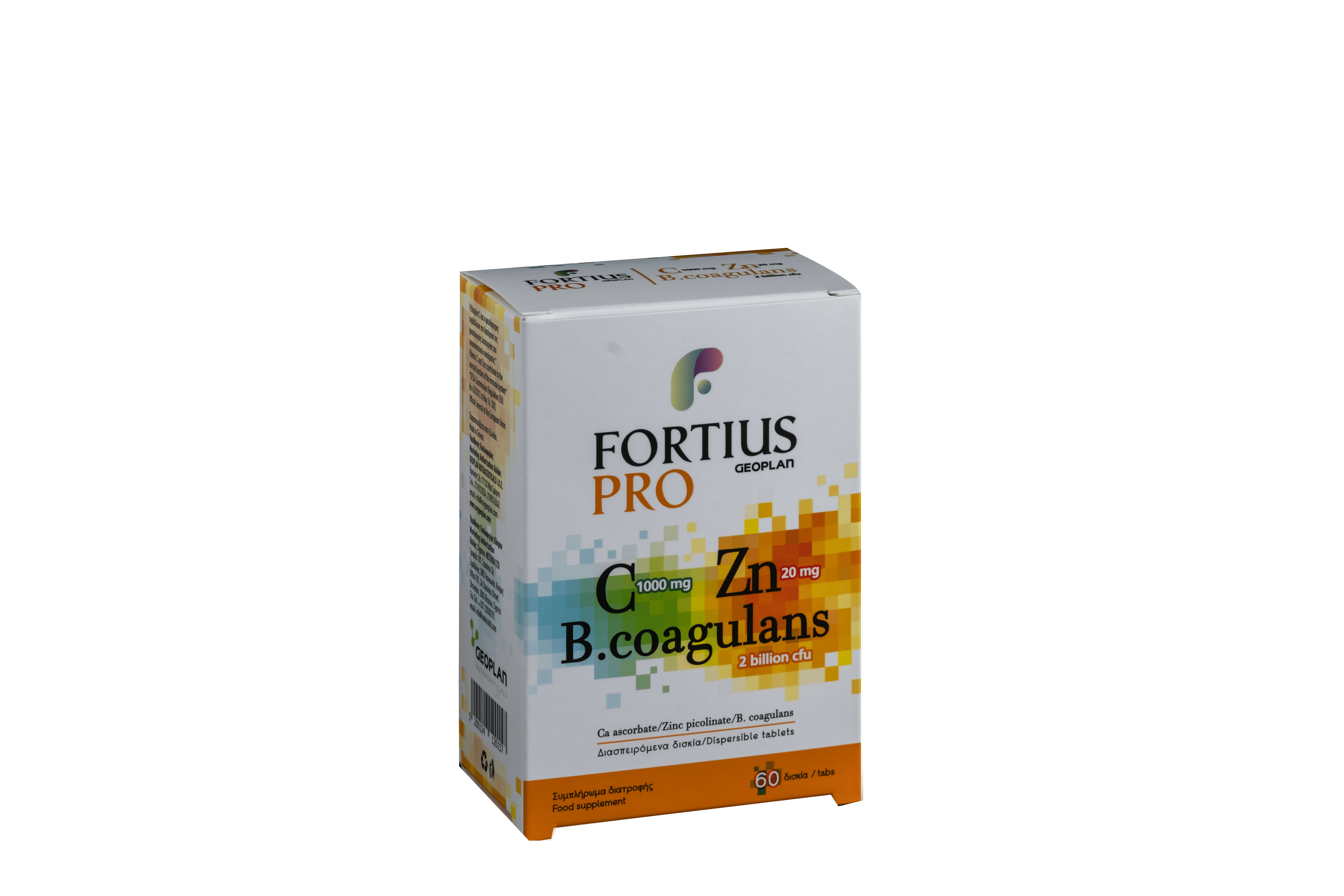FORTIUS PRO
FORTIUS PRO
Food supplement
1000mg Vitamin C* (calcium ascorbate & sodium ascorbate),
20mg Zinc* (zinc picolinate), 2 billion cfu Probiotics* (bacillus coagulans)
*daily serving (2 tablets)
60 dispersible tablets
Introduction
FORTIUS PRO is the special combination of three essential elements (vitamin, mineral and probiotics) for the human body and its functioning. For the best possible absorbance and efficiency, it comes in the form of dispersible tablets.
Vitamin C (calcium ascorbate and sodium ascorbate) in non-acidic and easily absorbed form
Zinc (zinc picolinate) in a form that succeeds the best possible absorbance
Probiotic strain bacillus coagulans that supports the proper function of the gastrointestinal tract
Ingredients
Vitamin C (calcium ascorbate & sodium ascorbate)
Calcium ascorbate is a non-acidic form of vitamin C. It is suitable for people with gastrointestinal disorders as research shows that its use causes significantly fewer epigastric side effects than ascorbic acid and is much better tolerated. [1] Studies also show that calcium ascorbate is more easily absorbed and less rapidly excreted than L-ascorbic acid. [2]
Sodium ascorbate is also a non-acidic form of vitamin C as it is the sodium salt of ascorbic acid and is recommended for people with gastrointestinal disorders. [19]
Zinc (as zinc picolinate)
The form of zinc used in FORTIUS PRO is zinc picolinate as studies show it to be the best absorbable source of zinc. [4]
Probiotic strain bacillus coagulans
Bacillus coagulans (lactobacillus sporogenes) is a strain of probiotics in the form of seeds. The resistant form of seeds allows to survive through the acids of the stomach, so they reach the small intestine where they germinate and multiply. [5]
| SUPPLEMENT FACTS | ||
|---|---|---|
| Serving size: 2 tabs / Servings per Container: 30 | ||
| Ingredients | Amount per Serving (2 tabs) | % R.I.* |
| Vitamin C (500mg as Calcium ascorbate and 500 mg as Sodium ascorbate) | 1000 mg | 1250 |
| Zinc (as Zinc picolinate) | 20 mg | 200 |
| Bacillus coagulans | 2 billion cfu | ** |
| Calcium L‐threonate | 20 mg | ** |
| Αcerola extract (Malpighia glabra L.) std. 17% Ascorbic acid | 20 mg | ** |
| Rosehip extract (Rosa canina L.) std. 6% Ascorbic acid | 20 mg | ** |
| *R.I.: Reference Intake | ||
Does not contain: Gluten, artificial colors, lactose, preservatives. Suitable supplement for vegetarian and vegan diets.
Vitamin C
- is one of the most powerful antioxidants in nature
- protects from DNA oxidation and, thus, slows down the aging process
- contributes to the normal functioning of the immune system [4]
- increases iron absorption [4]
- contributes to the normal formation of collagen for the normal functioning of blood vessels, bones, cartilage, gums, teeth and skin [4]
According to the scientific literature
- Vitamin C deficiency can increase the risk of respiratory infections by affecting the immune system.
- Vitamin C supplementation is important to prevent pneumonia (for both children and adults). [5]
- Serum vitamin C concentration is inversely related to the incidence of stroke. [6]
- High plasma vitamin C levels are associated with a significantly reduced risk of developing diabetes. [7]
- Through its antioxidant action, it protects the macula of the eye from ultraviolet radiation and slows down the development of cataracts. [8]
Zinc
- is an extremely important mineral which contributes to the vital chemical reactions of more than 300 enzymes. [9]
- supports the normal functioning of the immune system and the protection of cells from oxidative stress. [4] The mechanism is based on the proper regulation of lymphocyte growth. [10]
- plays a part in the normal synthesis of DNA and proteins as well as to the process of cell division. [4] It is therefore important to be at adequate levels during periods of rapid development such as childhood, adolescence and pregnancy. [11]
According to the scientific literature
- Zinc participates in the normal secretion of growth hormone. [12]
- Zinc is instrumentalin insulin production and helps to avoid complications that usually accompany diabetes such as vision problems and slow wound healing. [13]
- Zinc plays an important role in macula’s health; Zinc deficiency has been associated with cataracts and poor eyesight. [14]
Bacillus coagulans
- is a probiotic strain in the form of seeds that allows it to survive through stomach acids and reach the small intestine, where it germinates and multiplies. [3]
- supports the immune system and strengthens the response to viral infections. [15]
- helps with diarrhea or constipation, flatulence, irritable bowel syndrome (IBS). [16]
- affects significantly the health of the oral cavity and reduces the number of bacteria that cause tooth caries. [17]
- strengthen the immune system of children and reduces substantially the symptoms of the upper respiratory tract infections (nasal congestion, bloody nasal mucus, hoarseness). [18]
References
- Gruenwald J et al, Safety and tolerance of ester-C compared with regular ascorbic acid. Adv Ther. Jan-Feb 2006;23(1):171-8.
- Barrie S A et al, Comparative absorption of zinc picolinate, zinc citrate and zinc gluconate in humans. Agents Actions 1987 Jun;21(1-2):223-8.
- Jurenka J S, Bacillus coagulans: Monograph. Altern Med Rev. 2012 Mar;17(1):76-81.
- Commission Regulation (EU) No 432/2012 of 16 May 2012, Official Journal of the European Union.
- (Jai K Das et al, Vitamin C supplementation for prevention and treatment of pneumonia. Cochrane Database Syst Rev. 2018 Sep; 2018(9): CD013134.
- Yokoyama T et al, Serum vitamin C concentration was inversely associated with subsequent 20-year incidence of stroke in a Japanese rural community. The Shibata study. Stroke 2000 Oct;31(10):2287-94.
- Harding AH et al, Plasma vitamin C level, fruit and vegetable consumption, and the risk of new-onset type 2 diabetes mellitus. Arch Intern Med 2008 Jul 28;168(14):1493-9.
- Ravindran RD et al, Inverse Association of Vitamin C with Cataract in Older People in India. Ophthalmology. 2011 Oct; 118(10): 1958–1965.e2.
- McCall KA et al, Function and Mechanism of Zinc Metalloenzymes. J Nutr. 2000 May;130(5S Suppl):1437S-46S.
- Jarosz M et al, Antioxidant and anti-inflammatory effects of zinc. Zinc-dependent NF-κB signaling. Inflammopharmacology. 2017; 25(1): 11–24.
- https://ods.od.nih.gov/factsheets/Zinc-HealthProfessional/
- Miletta MC et al, The role of zinc dynamics in growth hormone secretion. Horm Res Paediatr. 2013;80(6):381-9.
- Poudel R et al, Role of zinc in insulin regulation and diabetes. J of Soc Health and Diabetes, Vol 5, Issue 2, July-December 2017.
- Khoo HE et al, Nutrients for Prevention of Macular Degeneration and Eye-Related Diseases. Antioxidants (Basel). 2019 Apr; 8(4): 85.
- Baron M, A Patented strain of Bacillus coagulans increased immune response to viral challenge. Postgrad Med. 2009 Mar;121(2):114-8.
- Sudha M R, Gastrointestinal diseases and stomach disorders. Bacillus coagulans unique IS2 and digestive health. EC Gastroenterology and Digestive System ECO.01 (2019): 06-08.
- Cagetti MG et al, The use of probiotic strains in caries Prevention: A systematic review. Nutrients. 2013 Jul; 5(7): 2530–2550.
- Anaya-Loyola M A et al, Bacillus coagulans GBI-30, 6068 decreases upper respiratory and gastrointestinal tract symptoms in healthy Mexican scholar-aged children by modulating immune-related proteins. Food Res Int. 2019 Nov;125:108567.
- Bush M J et al, An acute study on the relative gastro-intestinal absorption of a novel form of calcium ascorbate. Res Commun Chem Pathol Pharmacol. 1987 Jul;57(1):137-40.
Dosage
1-2 dispersible tablets daily or as directed by a healthcare professional. Preferably taken with meals.
Manufactured in Greece
Marketing Authorization Holder:
GEOPLAN – Prousis 26, 17123 Nea Smyrni
T: +302110123554 | E: info@geoplan.gr.com | W: www.geoplan.gr.com


